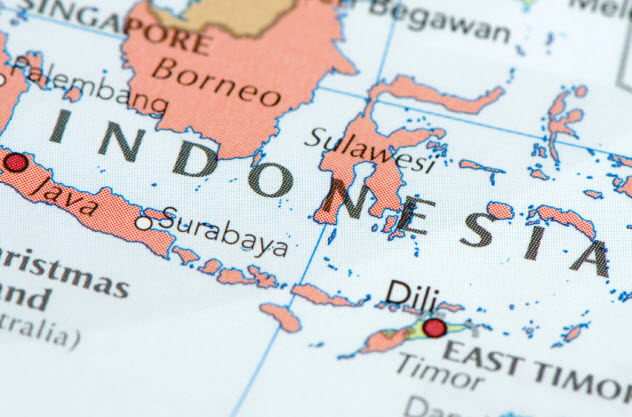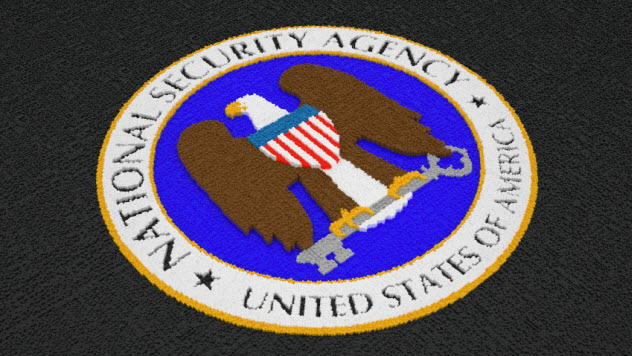 Weird Stuff
Weird Stuff  Weird Stuff
Weird Stuff  Animals
Animals 10 Inspiring Tales of Horses Being Human
 Mysteries
Mysteries Top 10 Haunting Facts About the Ghost Ship MV Alta
 History
History 10 Surprising Stories About the Texas Rangers
 Humans
Humans 10 Philosophers Who Were Driven Mad by Their Own Theories
 Miscellaneous
Miscellaneous 10 Video-Game-Worthy Weapons and Armors from History
 Weird Stuff
Weird Stuff 10 Psychics Who Accurately Predicted Wartime Events
 The Arts
The Arts 10 Pieces of Art Inspired by a Broken Heart
 Health
Health 10 Science Fiction-Sounding New Medical Treatments
 History
History 10 Surprising Facts About the Father of Submarine Warfare
 Weird Stuff
Weird Stuff 10 Times Real Laws Were Based on Bizarre Hypotheticals
 Animals
Animals 10 Inspiring Tales of Horses Being Human
 Mysteries
Mysteries Top 10 Haunting Facts About the Ghost Ship MV Alta
Who's Behind Listverse?

Jamie Frater
Head Editor
Jamie founded Listverse due to an insatiable desire to share fascinating, obscure, and bizarre facts. He has been a guest speaker on numerous national radio and television stations and is a five time published author.
More About Us History
History 10 Surprising Stories About the Texas Rangers
 Humans
Humans 10 Philosophers Who Were Driven Mad by Their Own Theories
 Miscellaneous
Miscellaneous 10 Video-Game-Worthy Weapons and Armors from History
 Weird Stuff
Weird Stuff 10 Psychics Who Accurately Predicted Wartime Events
 The Arts
The Arts 10 Pieces of Art Inspired by a Broken Heart
 Health
Health 10 Science Fiction-Sounding New Medical Treatments
 History
History 10 Surprising Facts About the Father of Submarine Warfare
10 Ways To Get A Job As A CIA Spy
With the release of another Bond movie and all its appeal, more people may find themselves drawn to a career shrouded in secrecy. Even more may find themselves wanting to be on the front lines of intelligence battles being waged every day with terrorist groups like ISIS. Here’s what it really takes to be a spy.
10 Learn A Hard Language

Want to really stand out when applying to be part of the CIA or MI6? Then study a language like Arabic, Chinese, or Korean. These are among the hardest languages for English speakers to learn and among the ones in highest demand for intelligence agencies. Granted, it does take several years to learn them, but the obstacles really aren’t so bad. After all, if you can’t handle learning a new alphabet or memorizing a few thousand characters, what makes you think that you can handle a small army of henchmen led by an evil madman intent on taking over the world?
In all seriousness, not only does learning one of these languages help you catch the eye of the intelligence agency’s recruiters, it also helps you skip the line, too. More than 10,000 people apply every month for the CIA alone, but if you can prove proficiency in Arabic or Chinese, you get preferential treatment and will be one of the first evaluated for potential employment.
9 Learn An Easy Language

As we said, Arabic, Chinese, and Korean are all hard to learn. Russian, the next most demanded language, isn’t much easier. However, the good news is that there are plenty of other languages that are considered to be mission-critical languages. Sorry, your high school Spanish isn’t going to cut it.
Indonesian is probably the easiest language on the list of mission-critical languages. Its importance is only going to increase because Indonesia is the world’s largest Muslim country by population and it has problems with piracy.
Luckily, if you choose to learn Indonesian, you get to learn a language without plurals, verb tenses, or cases, a welcome change from certain other tongues. Likewise, if you can get past the relatively easy alphabet, Persian offers a way to draw on common Indo-European roots like baradar for brother. You also get a double bonus: Persian and Dari (the form of Persian spoken in Afghanistan) are about as different as UK and US English, but the CIA treats them as separate languages and gives you bonuses for both.
8 Military Background

Let’s say that languages aren’t your thing. Maybe, you weren’t good at school, either, so you joined the military right after high school. In that case, you’re actually in a great position to be considered for an intelligence role.
It’s no secret that the intelligence services actively recruit from the military for their Department of Clandestine Services. That group gets to do things even cooler than the name sounds. They’re the ones who blow up random assets like James Bond does.
However, there is a catch. Just because you were in the military doesn’t mean that you’ll suddenly get fitted for a bulletproof tuxedo. Instead, the CIA draws heavily from certain formations when recruiting for these roles. Navy SEALs, Marine Force Recon, Army Delta Force, and Air Force Pararescue units are the top sources for the sort of operators that intelligence agencies like to recruit.
7 International Experience

Even if you’re not a Special Forces type of person, there are still plenty of roles within the Clandestine Directorate for you. Maybe instead of blowing things up, you’re more suited to extracting intelligence from an old chum or a new flame. In that case, you’d better have wit, charm, and some serious international experience.
That semester abroad may be a start, but if you’ve had serious experience overseas, then you’re even more of a potential asset to the intelligence agencies. After all, who better to move effortlessly through a foreign culture than someone who has already spent plenty of time in that culture?
Even if your experience wasn’t in Beijing or Tehran, you could still be useful. You’ve already learned how to move around a different culture without looking like a foreigner, or at least, you don’t need anyone to explain what a bidet is.
6 Be In Good Shape

Of course, being in good shape is essential for that job of chasing thieves with stolen uranium down some third world alley. However, the CIA does not want a slouch even for a desk job. Every potential employee has to get medical clearance because you could be whisked away at a moment’s notice to the far side of the world with little in the way of medical care.
That said, even desk employees have constant opportunities to stay fit. The CIA headquarters has fitness centers, fields for pickup games of softball, and more. The restrooms even have scales to allow employees to check on their progress.
It’s even more apparent at other agencies such as the FBI. After all, FBI agents are law enforcement officers, so they have to meet yearly physical requirements.
5 Math And Computer Science

So far, we’ve focused on the qualitative aspects of intelligence. However, there’s still an incredible amount of intelligence gathering that is quantitative in nature. As a result, math majors and computer science wizards are in incredibly high demand by intelligence agencies.
However, it’s not just being able to hack into terrorist databases that makes these professionals so valuable. Instead, it is what they can do with that knowledge from a cryptographic standpoint. The ability to build incredibly complicated codes—the type that would need a mastery of spherical geometry and differential equations to simply understand where the code starts and stops—is vital.
Math and computer science majors have the ability to do that. Just as importantly, they have knowledge of the fields necessary to tear those codes apart to find hidden meaning. In this case, being armed with a programming language and algorithms is much more dangerous than a silenced gun.
4 Analytical Background

Language nuts and math majors aren’t the only ones who end up working in intelligence. A lot of people come from an analytical background. In short, there’s hope for the student who majored in liberal arts!
Seriously, any field in which a great deal of analysis is necessary is likely to get a nod of approval from the intelligence agencies. There is always a need for a variety of roles. A science background may lead to analyzing the capabilities of a rogue state to produce biological weapons while an accounting background may lead to tracking terrorist funding.
The ability to think clearly and critically under pressure is a common requirement for all types of intelligence work, from analysts to field agents. Whether it’s a degree in business, science, or the classics, if you can prove that you have such a background, you will do well with your application.
3 High Credit Score

Your academic and professional backgrounds aren’t the only things that the intelligence agencies will be interested in when they are considering you for employment. Little can sink a prospective candidate faster than having a low credit score.
The reasoning for this is pretty simple: More than anything else, history has shown that people sell out their country’s secrets for cold, hard cash. A high credit score is a strong hint that you have no external motivation to betray the secrets with which you’ll be entrusted.
Of course, the agencies do consider mitigating circumstances and weigh them with your skill set. Someone who speaks perfect Chinese, went into debt over health expenses, and is repaying that debt will fare far better than someone who has a business degree and went into debt buying beer and food in college. However, it’s best to avoid letting your credit flounder. Above all, be honest if it is less than perfect.
2 Secrecy And Loyalty

When you first apply to work with the intelligence agencies, you’ll be warned to keep your application for such sensitive work close to your chest. Simply put, these people don’t want your cover to be blown before you’re even hired! As one agency website puts it, the wrong kind of attention could be attracted from having an open application at one of these places. Even after being hired, you’ll find that many people are reluctant to talk about their work.
This secrecy allows you to maintain absolute loyalty to the country that the agency protects. That loyalty will often be examined, whether through filing paperwork each time you leave the country or having background checks that include interviews with any foreign contacts with whom you’ve had more than incidental contact. After all, if an intelligence agency is about to trust you with some of its most important secrets, they should at least know what you did last summer.
1 Know Your Options

As you can see, there is a wide range of intelligence work out there for people who are interested in serving their country in a more secretive way. And we do mean their country. Sorry, would-be James Bonds, but MI6 is off-limits to all but British nationals who have spent most of the last 10 years in the UK.
Of course, there is always the CIA, but that’s not the only intelligence agency in the US. For those who prefer signals intelligence, emails, or phone calls, there’s the NSA. If you prefer maps, there’s the Geospatial Intelligence Agency. Those who want to follow the money may prefer to work for the Department of the Treasury’s Office of Terrorism and Financial Intelligence. All in all, the US intelligence community has 17 known agencies. And those are just the ones they’re telling us about.
Kevin Newton is a freelance consultant on the Islamic world, especially Islamic law. Admittedly, that’s pretty exotic stuff for someone from the hills of East Tennessee. Despite what some family members believe, he is not a spy.








